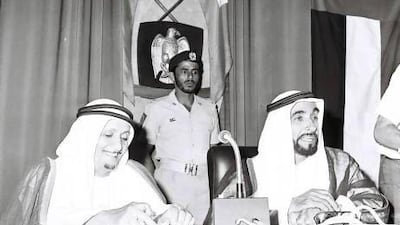ABU DHABI // Long before the UAE was formed, shura was the common form of governance.
After the federation, shura became one of the five pillars of the constitution.
This came to be known as the 40-member Federal National Council, all of whom were appointed by rulers of the seven emirates and allowing full representation.
In an interview featured in the FNC's magazine earlier this month, Mohammed Al Murr (Dubai), speaker of the FNC, said this reflected the late Sheikh Zayed and the founding fathers' deep faith in Shura. When the FNC convened for the first time in 1972, Sheikh Zayed said it marked an important time in the history of the country, as the council would play an important role in the field of development and in building a bright future.
"My brother members, in these historical, critical moments as your council comes together, the masses of citizens on this good earth...are looking at you confident that with God's help will contribute in achieving their hopes in pride and strength, progress and well-being," Sheikh Zayed said.
He also encouraged FNC members to speak freely and express the needs of locals honestly.
Since then, the council has held 493 sessions, during which members have debated seven constitutional amendments, passed 533 bills to which they made valuable changes, discussed 282 issues of public interest and helped lobby for certain issues, and have faced ministers with 483 questions. On the international level, they have issued 67 statements on local, Arab and international issues of interest to the UAE and have reviewed 675 international treaties and agreements.
But a pivotal moment for the FNC came in 2005 when the president, Sheikh Khalifa, said more powers and a greater role were in the works.
He announced a new road map for political reform to strengthen public participation and allow further freedom of expression.
"We will do our best so that our council will become more powerful and effective and closer to domestic issues and concerns of citizens, with the true values of participation and a deliberative approach being well established through a gradual process of development," the president said.
The new programme was called Tamkeen, or empowerment.
After that, constitutional amendments were made to allow half of the 40-member council to be elected by an electoral college, and women were allowed to become members. Meeting sessions were extended from two to four years, and required to be no fewer than seven months in a year. The Ministry of FNC Affairs was also established.
The purpose of the changes, said Sheikh Khalifa, was to "promote a culture of political participation among citizens and create a mood of democracy, respecting the rights of others and allowing them the freedom of expression that the constitution of the UAE has guaranteed".
In 2006 at the first elections, more than 6,000 citizens were given the right to vote. Many were women. Of those who ran for a seat in the council, one woman, Dr Amal Al Qubaisi (Abu Dhabi), succeeded. She was followed by eight other appointees.
Female members took no time to settle in, at times leading discussions locally and internationally.
Their effective role was seen again during the 2011 elections - the largest the country has witnessed.
At that point, more than 129,000 citizens were deemed eligible to vote.
Dr Sheikh Al Erri (UAQ) was re-elected, and later joined by six other women members. Dr Al Qubaisi was appointed following her proactive role in the council the previous four years. She then became a deputy speaker, the first woman to do so in the GCC.
Since her appointment she has headed two public sessions in the capital. International organisations, including the United Nations, have applauded the UAE for its successful track record in hosting and supporting women in parliament.
"This process is based on phases, where each phase boosts another and builds on it," said Dr Anwar Gargash, Minister of State for Federal National Council Affairs, said. Wam, the state news agency, said this indicated that for the next elections, there would be no ceiling on the numbers of those who can be appointed to the electoral colleges.
In the president's most recent speech, delivered by Sheikh Mohammed bin Rashid, Vice President and Prime Minister and Ruler of Dubai, he said more participation was expected.
"We are going forward firmly to bring our political experience to its [desired] ends so as to achieve development and expand participation. We are also looking forward to the pivotal role of the FNC, as a supportive and control authority to further strengthen the government with its visions and innovative ideas."
osalem@thenational.ae

